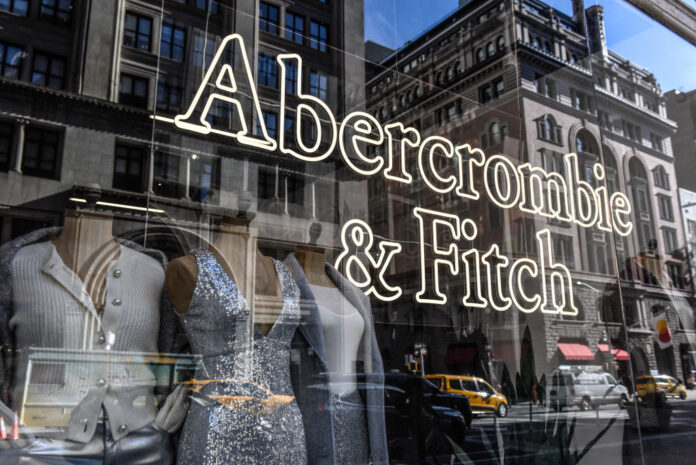It’s Bachelorette season in America.
A couple of months ago, I was at such a party in Florida: nine women, one room, a million group activities to dress up for. And strange things begin to happen. Almost every time I’ve complimented someone’s outfit — a nice jumpsuit or matching set — the response has inevitably been: “Thanks, it’s from Abercrombie.”
wait, Abercrombie and Fitch? The dark shop in the mall Reeked of cologne And there were salespeople who were hot and white and wearing practically nothing? What year is it?
Back home in New York, I stumbled upon a real-life Abercrombie store and decided to investigate. The first thing I noticed was that it didn’t smell. Like anything.
Then, I was impressed by the clothes: good quality, decent price, and style that worked for the 86 weddings I’ll be attending over the next calendar year.
I bought an engagement party-appropriate dress, then headed to Central Park for a softball game with some of my old coworkers. One of them notices my shopping bag and tells me I’m not alone in rediscovering Abercrombie.
So many people are getting familiar with the brand that its stock is silent acquired 285 percent last year, making it the best-performing stock in the S&P index. It’s even the beat Out AI chipmaker Nvidia. And it’s not like it just created a meme stock: Abercrombie More than 4 billion dollars Revenue in the last financial year.
So, how did Abercrombie pull off its stunning renaissance — seemingly under the radar?
“Are we excluded? Absolutely.”
This isn’t Abercrombie’s first comeback. One of the original American clothing brands, Established in 1892It dressed everyone from President Theodore Roosevelt to Amelia Earhart. But the star of the company turned and it ended Filed for bankruptcy In 1976.
Then, in 1988, it was acquired By The Limited, owns major mall clothing brands such as Victoria’s Secret. It put a new CEO, Mike Jeffries, in charge. Jeffries turned Abercrombie into a mall staple targeting American prep and a new teenage clientele with a new, hypersexualized flavor.
“Every school has the cool and popular kids, and then the not-so-cool kids,” Jeffries to say Salon in 2006. “Frankly, we go after cool kids … a lot of people don’t belong [in our clothes]And they cannot belong. Are we exclusionary? Absolutely.”

These exclusionary policies have worked in some ways — Abercrombie & Fitch has become an iconic part of the culture, as has the name recognition on the show. friendsFor example. But in a much bigger way, it lands the company straight into hot water. Over and over. Over again.
In 2002, it sold thongs with phrases like “eye candy” and “wink wink.” Children’s section. Later that year, it declined t-shirt Designed to look like an ad for a Chinese laundromat, with the racist slogan “Two Wang Can Make It White.”
There was even a case in the Supreme Court. Samantha Elauf, a Muslim woman, alleged that the company refused to hire her because her hijab did not comply with their “look policy” for employees. (“It’s really that simple,” Justice Antonin Scalia said (When he handed off a victory for Elauf in 2015.)
All this is happening in a growing contrast Positive body movement. Finally, inequality — combined with the economic fallout from the Great Depression — proved too much. Finally, in 2016, Abercrombie’s share price fell until it became America Most hated retailer. RIP

Abercrom-back
After the brand’s fall from grace, Abercrombie’s C-suite got a makeover. Jeffries was push out 2010s, and new executives took his place. Their first priority was to undo some of the damage Abercrombie had done to its image.
Old Abercrombie (in) famous rejection To sell clothes larger than L or women’s size 10. The new Abercrombie goes up to size 32. Now, instead of overly sexy photoshoots, its ads are more tasteful, with models representing a wider range of potential customers. .
New Abercrombie too less attentive About responding to fashion trends and satisfying high school hierarchies, and more about equipping a new generation of 20-somethings with basic, wedding- and work-appropriate quality pieces, well-fitting denim and sturdy workout clothes.
“They’re using a lot of high-end materials like wool and cotton and cashmere, and there’s also a lot of attention to fit,” says Elizabeth Segran, senior writer at Fast Company. to say Today, explained. “It’s really important because it’s happening in the context of fast fashion. And the fast fashion world famously makes clothes as cheaply as possible and makes them so trendy that you throw them away after a few wears. This is clearly going against them.”
Segran says there’s a reason you haven’t seen the big, splashy ads announcing Abercrombie’s return Instead of doing a full public relaunch of the brand — which would probably have required some kind of acknowledgment of its sordid history — Abercrombie executives said they wanted to let the products lead.
They wanted customers to feel like they had discovered the new Abercrombie for themselves. So they partnered with content creators on social media, opened new (unscented) stores in strategic locations and relied on word of mouth to do the rest.

“Our plan is to go from fashion’s best-kept secrets to their favorite brands,” said Kerry Krug, Abercrombie’s head of merchandising. to say Fast Company.
So far, it’s working.
Segran said Today, explained This revival is not just an Abercrombie story. J. Legacy retailers like Crew and Gap — which have struggled to compete with young direct-to-consumer brands like Everlane and Reformation — could learn a thing or two from Abercrombie’s revival.
“Abercrombie’s story shows us that if a brand has this long history and a place in American retail history, it can come back.”
This story was originally published by Today, explainedVox’s flagship daily newsletter. Sign up for future editions here.


